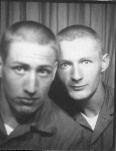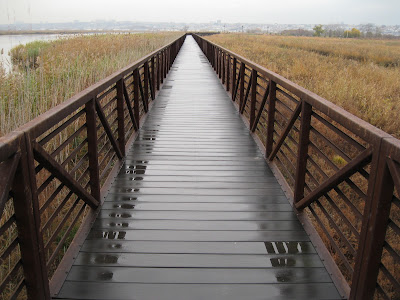Chapter 3: Waiting in the dark
The gas station’s pay phone hung from its hook, wires spilling
out from the mouthpiece. So, I had to cross Crooks Avenue to the Paterson side
to find a working phone, and luckily found a few coins left over in my suit
pocket from some previous use, dropping several into the slot after getting
information to provide me with the number of the cab company.
Clifton likely had its own cabs, but I couldn’t recall any
of the names – only Veterans Cab company located off Market Street in downtown
Paterson, whose doorway I had passed frequently, but never thought to use, a dark
office filled with broad shouldered men wearing out of date hats and smoking stubs
of cigars that stained the windows – an office that never closed.
Hank, my best friend, often relied on the company to get him
home after arriving too late from our adventures in New York City to get the
last bus to Haledon. He could have walked home the way I did during those late
hours, only his route took him through some of the toughest neighborhoods of
Paterson, a route on which he’d been mugged more than once during day light
hours, a much deadlier journey by night.
A gruff voice sounded from the other end of the receiver. I
could almost smell the cigar smoke through the phone, and envisioned this tough
middle-aged Italian seated behind his paper covered desk.
“What do you want?” the man asked.
“I need a cab,” I said.
“I sort of figured that, bub, since you’re calling me. I’m
not calling you. Where are you and where do you want us to dump you off?”
I hesitated. The word “New York” got stuck in my throat.
I thought it might be too far for them to want to go. I also
thought of my uncles and the police and how easy it might be for them to later
track me.
Buses were impersonal. Almost anyone could climb aboard one
day or night without significance. A cab right was something else. Cabs kept
records of where they picked people up and where they dropped them off. And as
sleepy as the driver might be, he could not help looking back as his passenger,
especially this time of night, and giving a description later.
“Well, bub?” the dispatcher asked again. “Have you decided
where you want to go?”
“I want to go to New York City,” I said, forcing the words
out, hearing them get wrapped up in the static of the phone.
“This time of night?”
“Yes,” I said.
“Okay,” the dispatcher said with me imagining the shrug of his
shoulders. “It’s your money. Where are you? I’ll send a cab right over.”
I gave him my location, then eased out of the phone booth.
Although dawn was coming, the streets remained dark except near
the bus stop. While someone stirred in the gas station, the doors remained
unopen and the attendant – dealing with some pre-opening issues inside – had not
yet turned on the lights above the gas pumps.
Across from me the even darker bank loomed like a brick
walled fortress in front of which I had once stood with my mother to watch John
F. Kennedy’s campaign motorcade pass back before we had moved to the projects,
back before my mother went completely mad.
I stood outside the phonebooth where a string of small shops
lined that portion of Main Street, thinking I should stand under a streetlight
so that cab would not miss me, yet scared to stand out too much in case a patrol
car came by first.
I decided to cross the street to the bank side and stand near
the bus stop, assuming that I might look less suspicious waiting for a bus than
standing in the deeper shadows of the still unopened stores.
I wore no watch. Time dragged on. I envisioned my uncles
stirring awake, rolling over, squinting at the clocks they kept on their
dresser. I imagined Harold reaching for his pants on the back of the chair in
the attic and puzzling as to why they were no longer there.
If I lucked out, he would not seek to dress immediately, but
stumble down to the second-floor bathroom first – giving me extra few moments
wait for the cab to come.
Where was that fucking cab anyway? I could see the glow of
the bank clock through the windows but could not read the hands. I guessed 15 minutes
had passed from when I hung up, more than enough time for the cab to make its
way from Clark Street and Market to this end of Paterson.
A few cars passed, some hurried early morning workers, a
milk truck with bottles rattling, one or two weaving cars driven by drunks
looking eye opening bars after having been cast out at last call from local
taverns at three. Each brought hope and
then despair as they passed, and I felt more exposed and frustrated, wondering
if one of them would eventually pull over and have one of my uncles behind the
wheel.
The traffic light went through cycle after cycle, sometimes forcing
one of the vehicles to stop, drivers squinting out through frosted windshields,
no doubt puzzled at me, a lone, dark under-dressed character struggling to
avoid notoriety. Finally, I saw a single set of headlights coming straight down
Main Street from the heart of Paterson, a car with a bubble of some sort on the
top of it, which could have been the light of a police officer car but turned
out to be a lighted bubble with the word “taxi” on it. The car caught me
momentarily in its headlights, and then pulled up to the curb
The driver leaned over, rolled down the passenger side
window.
“You can for a cab?”
I nodded and climbed in.
The man closed the window, and then looked back at me.
“You said you wanted to go to New York?” he asked. “Where
exactly?”
“The Port Authority,” I said.
He nodded, engaged the gears and drove through the light
into Clifton. I sighed and stared out the window, again saying farewell to the
landscape of my childhood which I never expected to see again.




Comments
Post a Comment